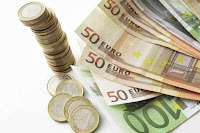EDIT: better information and studying the problem have come to the conclusion that the arguments set out in this post is a hoax, as I show here and here.
 I recently came across a number of websites and articles that answer a question my unconscious, "But if there is a debt , who is the creditor?".
I recently came across a number of websites and articles that answer a question my unconscious, "But if there is a debt , who is the creditor?". Why a debt assumes that there is someone to restore it and then: who we need our money?
It 's a question that remains outstanding when it comes to debt, and that remaining in ignorance, leads one to think that money is state owned, is public. But no: the money is owned banks. A bank in particular the Central Bank.
In the case of the euro European Central Bank (ECB).
But at least the bank's public? No, the ECB is a public limited company and, like all stock company pursues the interests of Shareholders or by the increase of capital.
The verification is immediate: on the notes is never referred to any public body or State or Europe, while on the coins minted by the Mint and then state owned, is the abbreviation for the Republic (the R and I superimposed).
The bottom line is this: the Central Bank release notes, at a negligible cost compared to the accepted value for each sheet (because in the era of new-economy money is no longer linked to gold), and lends money to the state (or states in the case of the ECB).
The problem raised by sites like this , lies in the mechanism of the loan.
Every time the ECB lends € 100 to the Italian Republic, the latter must (eg.) 104 € to the ECB. But those 4 € interest the state has no other way to obtain them than to ask for more money to loan to the Bank. So the deficit of the debtor State can only increase.
Probably for this reason that the state of health of a nation is measured in terms of deficit-GDP ratio and not in terms absolute.
However, perhaps, in these terms is too simplistic and a State may be able to increase his wealth to repay the interest to the Bank ... but it would be easier if the notes were owned by the state, such as coins?
Unfortunately my almost non-existent knowledge of economics, not allow me to fully understand the details of the problem and if some disinterested expert is offered for more clarification, I would be grateful ...
0 comments:
Post a Comment